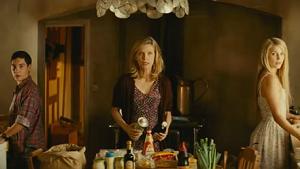
The Family is a lot of things; a deliriously violent black comedy, the first real Luc Besson film Luc Besson has made since 2011’s The Lady (which was itself preceded by a string of children’s movies and fantasy fare), the latest entry in his filmography well beyond his retirement date, and further proof to fuel suspicions that the ever-lovely Michelle Pfeiffer keeps a magical painting hidden somewhere in her attic, to name a few. But it’s primarily a film that’s about Robert De Niro, not just in his capacity as its leading man but as a fixture in mob cinema iconography, so much so that The Family wouldn’t make a lick of sense with another actor serving in his place.
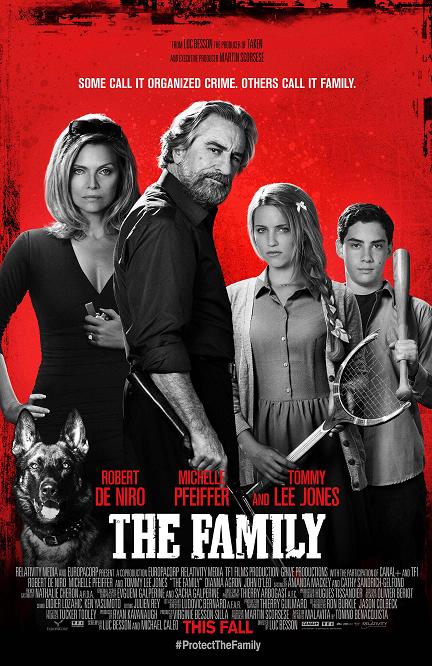 For De Niro aficionados who have been victimized by the soft-shoe routine he’s grown so fond of lately – seen mostly in pictures like The Big Wedding, the deplorable Fockers franchise, and random junk like Red Lights or Killer Elite – The Family may be something of a refreshingly introspective tonic. Alternately, one may see it as a cheap cash-in designed to trade on De Niro’s most notorious screen persona for a few shock laughs, but if it is that, then The Family still succeeds as a piece of slickly made commercial entertainment delivered with Besson’s trademark kinetic style. Ignore the central comment the film makes on De Niro’s legend; this is a production where we get to watch him ram a lit coal down his know-it-all neighbor’s throat.
For De Niro aficionados who have been victimized by the soft-shoe routine he’s grown so fond of lately – seen mostly in pictures like The Big Wedding, the deplorable Fockers franchise, and random junk like Red Lights or Killer Elite – The Family may be something of a refreshingly introspective tonic. Alternately, one may see it as a cheap cash-in designed to trade on De Niro’s most notorious screen persona for a few shock laughs, but if it is that, then The Family still succeeds as a piece of slickly made commercial entertainment delivered with Besson’s trademark kinetic style. Ignore the central comment the film makes on De Niro’s legend; this is a production where we get to watch him ram a lit coal down his know-it-all neighbor’s throat.
It’s all in his head, of course, but that heightens the fun instead of marring it (though he does occasionally treat himself to living out his outrageously savage fantasies). The Family, as you may gather from trailers, focuses on an ex-mafia capo (De Niro) who, almost twenty years after snitching on his partners in organized crime, spends his life roaming from one idyllically sleepy French village to the next with his wife (Pfeiffer) and kids (Dianna Agron and John D’Leo); the goal is safety, but they’re each so entrenched in their ways, both as Americans and as ex-members of Cosa Nostra, that they’re in constant danger of outing themselves to their new neighbors and subsequently to the clean-up crews fruitlessly searching for them across the country.
That’s the film’s big turn: eventually, the “Blakes” are found out, though like nearly everything else in The Family the discovery is played in over-the-top way possible. Besson’s not a man widely regarded as a fan of understatement, so perhaps one can chalk up the cranked-up elements of his film as part and parcel of his aesthetic – even Leon and The Lady, arguably his most nuanced works, toe the line of subtlety when it suits him. But there’s a sense that, whether he’s tracking the fateful journey of the off-hand clue which alerts the mob to the Blakes’ location or just blowing up a house with a bazooka, Besson’s busting a gut behind the camera; The Family reads as his attempt at self-parody.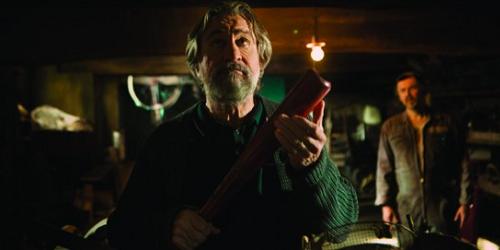
Maybe that’s a stretch, but the film certainly boasts enough visual and verbal gags to support the “comedy” moniker without being fussy. If there’s any one detail here that gives away Besson’s presence, it’s how fervently he mines humor out of graphic brutality; it’s Looney Tunes-level stuff that’s punctuated by some respectably bloody imagery. This is a mafia flick, after all, and as much as De Niro’s character can nail down ten things that lend him degrees of decency, he’s still a thuggish killer. It’s hard to say whether his daydreamed head-busting sprees or the ones he actually enacts are more cringe-worthy, but the guy does know his way around a baseball bat.
And why shouldn’t he? This is De Niro we’re talking about, a man who almost single-handedly romanticized the mythology of the American mobster in popular consciousness; few performers have contributed so much as he to a specific filmmaking genre. In a way, The Family feels like a metaphor for his career and a critique of the man himself, a titan of his profession relegated to appearing in either toothless mainstream product where he’s least recognizable as the man who played Travis Bickle and Vito Corleone, or desultory imitations of his best work that make a mockery of his reputation. The Family is clearly in love with the De Niro of old, especially his gangster roles, so it’s possible Besson intended on allegory. But that’s uncharacteristically esoteric of him, so happy coincidence may be the likelier scenario.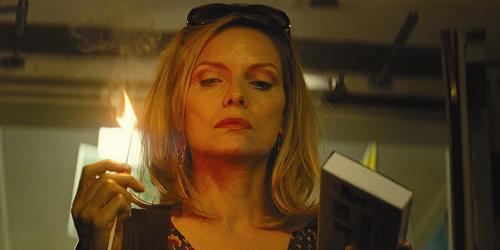
Whatever the case may be, it hardly matters to De Niro, who’s clearly having a ball playing his favored character archetype while taking stock of his past. (In a very literal sense, too, though exploring the particulars of that statement would give away The Family‘s most deliciously absurd moment. You’ll know it, and either love it or hate it, when you see it.) Pfeiffer’s right alongside him in the fun department, relishing every beat as the tough-as-nails mob wife; by comparison, the rest of the cast suffers, not for lack of trying but gross underwriting. Like their characters, Agron, D’Leo, and Tommy Lee Jones (playing the long-suffering CIA agent assigned to babysit them all) just make the best of an unfavorable situation, doing what they can to shine when De Niro and Pfeiffer aren’t dominating the proceedings.
G-S-T Ruling:
People who believe in the concept of guilt pleasures – junk foods, B-movies, reality TV shows – should find that The Family easily fits the bill. On the other hand, there’s no reason to feel bad while watching the film, unless you’re strongly morally opposed to gratuitous bodily harm or colorful language as a punchline. There’s no arguing that The Family is anything other than trashy, cartoonish spectacle, but Besson manages to strike the right blend of both pursuits; all potential navel gazing aside, the results are a surprisingly effective, hilariously excessive lark.
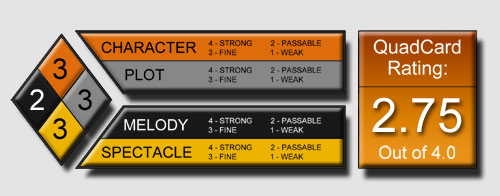
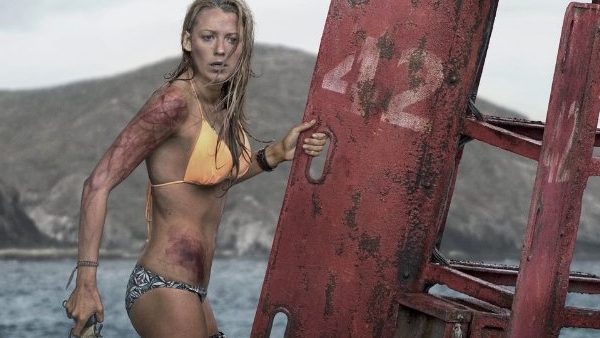
3 Comments
Colin Biggs
This looked like fun and more winking fun than the previous, more excessively campy times DeNiro has traded in on his gangster persona.
Andrew Crump
He drags a chemical plant executive behind his car down a quiet French road on his quest to figure out why the water that comes out of his sink is brown. It’s amazing.
Colin Biggs
That would sell me on the movie alone.